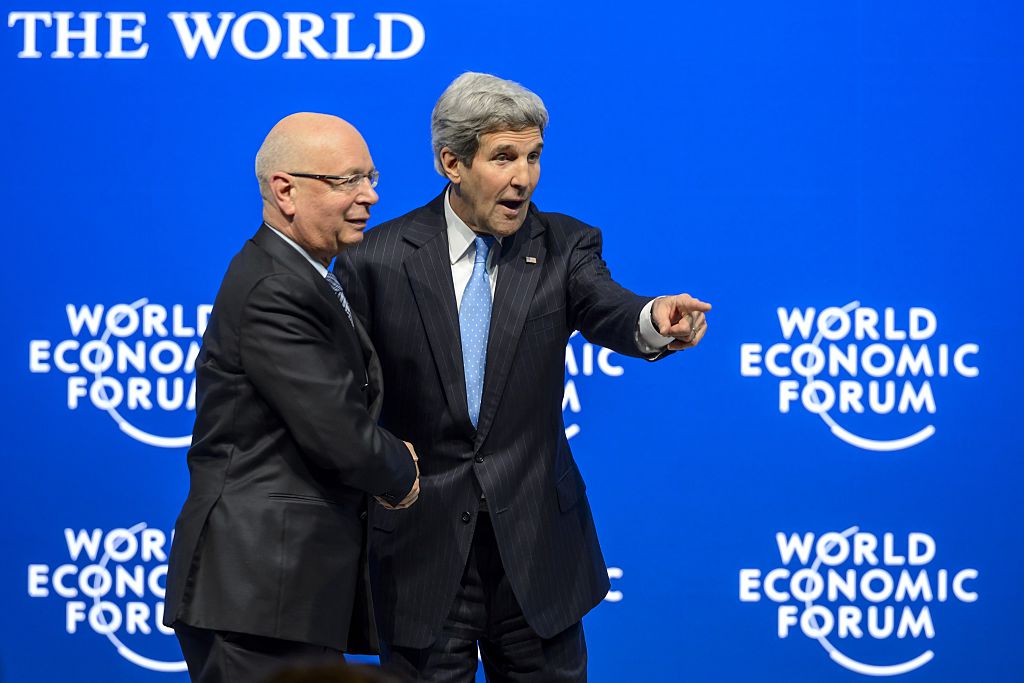Taking a stand against the machinations of our global elites.
On Popular Reason and Self-Rule

The global establishment's assault on national sovereignty.
“The following is an excerpt from Michael Walsh’s forthcoming book, Against the Great Reset: Eighteen Theses Contra the New World Order, which will be published by Bombardier Books and be available October 18, 2022. Walsh has gathered a series of essays from among eighteen of the most eminent thinkers, writers, and journalists—including the American Mind’s own James Poulos, as well as Claremont Senior Fellows Michael Anton and the late Angelo Codevilla—to provide the first major salvo in the intellectual resistance to the sweeping restructuring of the western world by globalist elites. See Michael Walsh’s original entry here. “
I think I know man, but as for men, I know them not.
—Jean-Jacques Rousseau
In a memorable passage at the beginning of The Critique of Pure Reason, Immanuel Kant evokes a soaring dove that, “cleaving the air in her free flight,” feels the resistance of the wind and imagines that its flight “would be easier still in empty space.” A fond thought, of course, since absent that aeolian pressure, the dove would simply plummet to the ground.
How regularly the friction of reality works that way: making possible our endeavors even as it circumscribes and limits their extent. And how often, like Kant’s dove, we are tempted to imagine that our freedoms would be grander and more extravagant absent the countervailing forces that make them possible.
Such fantasies are as perennial as they are vain. They insinuate themselves everywhere in the economy of human desire, not least in our political arrangements. Noticing the imperfection of our societies, we may be tempted into thinking that the problem is with the limiting structures we have inherited. If only we could dispense with them, we might imagine, beating our wings, how much better things might be.
What a cunning, devilish word: “might.” For here as elsewhere, possibility is cheap. Scrap our current political accommodations and things might be better. Then again, they might be a whole lot worse. Vide the host of tyrannies inspired by that disciple of airy possibility, Jean-Jacques Rousseau. “Man was born free,” he declaimed, “but is everywhere in chains”: two startling untruths in a single famous utterance. Rousseau was keen on “forcing men to be free,” but we had to wait until his followers Robespierre and Saint-Just to discover that freedom in this sense is often indistinguishable from what Robespierre chillingly called “virtue and its emanation, terror.” Something similar can be said about Karl Marx, that other acolyte of possibility. How much misery have his theories underwritten, promising paradise but delivering tyranny, oppression, poverty, and death?
It wasn’t so long ago that I had hopes that the Marxist-socialist rot—outside the insulated purlieus of humanities departments at Western universities, anyway—was on the fast track to oblivion. Has any “philosophy” ever been so graphically refuted by events (or the number of corpses it created)?
Maybe not, but refutation, like reason, plays a much more modest role in human affairs than we might imagine. In fact, the socialist-inspired utopian chorus is alive and well, playing to full houses at an antidemocratic redoubt near you. Consider the apparently unkillable dream of “world government.” It is as fatuous now as it was when H. G. Wells infused it with literary drama toward the beginning of the twentieth century.
All human children need to learn to walk by themselves; so, it seems, every generation needs to wean itself from the blandishments of various utopian schemes. In 2005, the political philosopher Jeremy Rabkin published a fine book called Law Without Nations? Why Constitutional Government Requires Sovereign States. Rabkin ably fleshes out the promise of his subtitle, but it would be folly to think this labor will not have to be repeated. The temptation to exchange hard-won democratic freedom for the swaddling comfort of one or another central planning body is as inextinguishable as it is dangerous. As Ronald Reagan memorably put it,
Freedom is never more than one generation away from extinction. We didn’t pass it to our children in the bloodstream. It must be fought for, protected, and handed on for them to do the same, or one day we will spend our sunset years telling our children and our children’s children what it was once like in the United States where men were free.
The late English philosopher Roger Scruton made the connection between this insight and the bulwark provided by the nation-state. “Democracies,” he wrote, “owe their existence to national loyalties—the loyalties that are supposedly shared by government and opposition.” Confusing national loyalty with nationalism, many utopians argue that the former is a threat to peace. After all, wasn’t it national loyalty that sparked two world wars? No, it was that perverted offspring, nationalism, which at great cost was defeated only by the successful mobilization of national loyalty. Scruton quotes G. K. Chesterton on this point: to condemn patriotism because people go to war for patriotic reasons is like condemning love because some loves lead to murder.
It is one of the great mysteries—or perhaps I should say it is one of the reliable reminders of human imperfection—that higher education often fosters a particular form of political stupidity. Scruton anatomizes that stupidity, noting “the educated derision that has been directed at our national loyalty by those whose freedom to criticize would have been extinguished years ago, had the English not been prepared to die for their country.” This peculiar mental deformation, Scruton observes, involves “the repudiation of inheritance and home.” It is a stage, he writes,
through which the adolescent mind normally passes. But it is a stage in which intellectuals tend to become arrested. As George Orwell pointed out, intellectuals on the Left are especially prone to it, and this has often made them willing agents of foreign powers. The Cambridge spies [Guy Burgess, Kim Philby, and others] offer a telling illustration of what [this tendency] has meant for our country.
It is also telling that this déformation professionelle of intellectuals encourages them to repudiate patriotism as an atavistic passion and favor transnational institutions over national governments, rule by committee or the courts over democratic rule. Rabkin reminds us of the naïveté—what others have called the “idealism”—that this preference requires. In order to believe that international bodies will protect human rights, for example, you would have to believe
that governments readily cooperate with other governments on common projects, even when such cooperation promises no direct exchange of benefits to each side. In the end, you must believe that human beings cooperate easily and naturally without much constraint—without much actual enforcement, hence without much need for force.
To believe this you must believe that almost all human beings are well-meaning, even to strangers. And you must believe that human beings have no very serious disagreements on fundamental matters.
The persistence of such beliefs is no guide to their cogency or truth. What another Jeremy, Jeremy Bentham, long ago called “nonsense on stilts” presents a spectacle that is perhaps unsteady but nonetheless mesmerizing. And when it comes to the erosion of the nation-state and its gradual replacement by unaccountable, transnational entities such as the E.U., the U.N., or the so-called “World Court,” the results are ominous.
The political tendency of such institutions was brilliantly captured by John Fonte’s coinage “transnational progressivism.” As Fonte explains in his book Sovereignty or Submission: Will Americans Rule Themselves or Be Ruled by Others? (2011), “transnational progressivism” describes the antinationalist impulse that seeks to transfer political power and decision-making “from democratic nations to supranational authorities and institutions” such as the European Union, the United Nations, the World Bank, the International Monetary Fund, and kindred organizations (“judges from the European Court of Human Rights and the International Criminal Court; career officials in the U.S. State Department, the British Foreign Office, and the German Foreign Ministry; American CEOs of major global corporations; NGOs such as Amnesty International, Human Rights Watch, and Greenpeace”; and so on and so forth).
A sterling contemporary example is the Great Reset recently proposed by the Davos-based WEF, which seeks “to revamp all aspects of our societies and economies, from education to social contracts and working conditions.” Exploiting the panic caused by the Covid-19 crisis, the WEF demands that “every country, from the United States to China, must participate, and every industry, from oil and gas to tech, must be transformed” in its socialist scheme to bring about a “Great Reset of capitalism.”
The true political ends of such elite enterprises are generally swaddled in emollient rhetoric about freedom and democracy. Thus the PR surrounding the WEF’s Great Reset is festooned with talk of “stakeholder capitalism,” “equality,” “sustainability,” and other items in the lexicon of socialistically oriented political obfuscation.
The real agenda, however, is revealed in its call for “changes,” i.e., increases in taxes on wealth, a turn away from reliance on fossil fuels, and “building ‘green’ urban infrastructure and creating incentives for industries to improve their track record on environmental, social, and governance (ESG) metrics.” Stepping back, John Fonte uncovered some revelatory gems that speak candidly about what’s really at stake. For example, Robert Kagan of the Brookings Institution put it with all possible clarity when he declared in 2008 that the “United States…should not oppose, but welcome a world of pooled and diminished national sovereignty” (my emphasis). “Pooled and diminished national sovereignty.” At least we know where we stand.
The question of sovereignty—of who governs—is at the center of all contemporary populist initiatives. It has been posed with increasing urgency as the bureaucratic burden of what has been called the “deep state” or administrative state has weighed more and more forcefully upon the political and social life of Western democracies.
The phenomenon is often identified with the election of Donald Trump in November 2016 and his candidacy in 2020. But the political, moral, and social realities for which Trump was a symbol and a conduit both predated his candidacy and achieved independent reality in countries as disparate as the United Kingdom, Hungary, Italy, and Brazil.
The question of sovereignty was perhaps most dramatically posed in the United Kingdom. In June 2016, more Brits voted to leave the European Union and return sovereignty to Parliament than had ever voted for any initiative in the long history of Great Britain. Some seventeen million people voted to leave the European Union and regain local responsibility for their own lives. That’s more people than had ever voted for anything in Britain. It took more than three years for that promissory note to be cashed. The U.K. formally began its split from the E.U. at 11 p.m. GMT on 31 January 2020. Like the Battle of Waterloo according to the Duke of Wellington, it was a “near run thing.” Prime Minister Boris Johnson promised that he would, deal or no deal, get Brexit done by the end of October 2019. He was stymied for months, as much by the established elites of his own party as by Labour.
The process of emancipation had not proceeded far before it was interrupted by the advent of a new Chinese import, the novel coronavirus which swept all other news from the front page for months (until, that is, it was half-superseded by the extortionist Kabuki theater of “Black Lives Matter”). As I write in the summer of 2021, Europe and the United States both are poised to return to a state of state-enforced semihibernation or “lockdown,” an insidious flu-like respiratory virus created in a Chinese virology lab having paralyzed their populations with fear and transported their governments with the tantalizing prospect of greater control over every aspect of life.
I am not sure I have ever heard Joe Biden utter the word “sovereignty.” But Donald Trump spoke about it often. In his first speech to the United Nations’ General Assembly in September 2017, he said to a startled roomful of diplomats that “we are renewing this founding principle of sovereignty.”
Our government’s first duty is to its people, to our citizens—to serve their needs, to ensure their safety, to preserve their rights, and to defend their values. As President of the United States, I will always put America first, just like you, as the leaders of your countries will always, and should always, put your countries first.
All responsible leaders have an obligation to serve their own citizens, and the nation-state remains the best vehicle for elevating the human condition.
Perhaps the most disturbing aspect of that speech was the shocked horror that it provoked among the entrenched globalist establishment for whom the whole idea of nation-states and patriotic allegiance to one’s country seems like a barbaric affront to common decency. Imagine, a president of the United States declaring his intention to foster the well-being and prosperity of his own citizens!
The American Mind presents a range of perspectives. Views are writers’ own and do not necessarily represent those of The Claremont Institute.
The American Mind is a publication of the Claremont Institute, a non-profit 501(c)(3) organization, dedicated to restoring the principles of the American Founding to their rightful, preeminent authority in our national life. Interested in supporting our work? Gifts to the Claremont Institute are tax-deductible.
All hail our globalist overlords.
The elite war on free enterprise.
America must sink so the world may rise.




